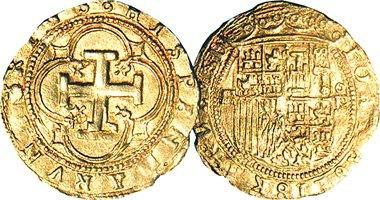Neil S Berman - Expert Numismatist & Gold Coin Dealer
Gold Coins Trade through History
Spanish Gold Escudo & Doubloon
 Spanish Gold Escudo & Doubloon 1516-1833. Coins minted in Sicily, Italy and France were circulating in Spain as early as the fifth century BC and coins were minted in Spain by 350 BC. The Visigoths issued coins until the Arab invasion of Spain in 711. During the Islamic period gold dinars were minted in Spain. Spain had several different monetary systems that coexisted in different parts of Spain before the unification of the Spanish monetary system using the Peseta. All were units of account that had specie money that tried to reflect the monetary divisions inherent in each system.
Spanish Gold Escudo & Doubloon 1516-1833. Coins minted in Sicily, Italy and France were circulating in Spain as early as the fifth century BC and coins were minted in Spain by 350 BC. The Visigoths issued coins until the Arab invasion of Spain in 711. During the Islamic period gold dinars were minted in Spain. Spain had several different monetary systems that coexisted in different parts of Spain before the unification of the Spanish monetary system using the Peseta. All were units of account that had specie money that tried to reflect the monetary divisions inherent in each system.
By 1390, Spanish merchants had to endure the simultaneous circulation of over one hundred types of coins. This ultimately led to monetary reforms in 1391, 1471, 1497, 1537, 1542, 1686, and 1772. In the New World Spanish gold coins were minted in one, two, four, and eight escudo denominations in hugh quantities, while Spain also produced a one-half escudo piece. The large eight escudo coin was called a double doubloon; later it became the coin the English colonists called the Spanish doubloon.
Tens of millions of Spanish cob and milled gold coins circulated throughout Europe, the European colonies in the New World and the Far East, even Africa, especially after 1704 when the West Indies adopted a gold standard. Spanish gold was regularly accepted in the early United Sates and continued to be minted in the New World until 1821. The first literally world wide gold trade coin circulated for over three hundred years until the economic and military decline of Spain forced the coins replacement by first the British Sovereign and later the American Double Eagle.